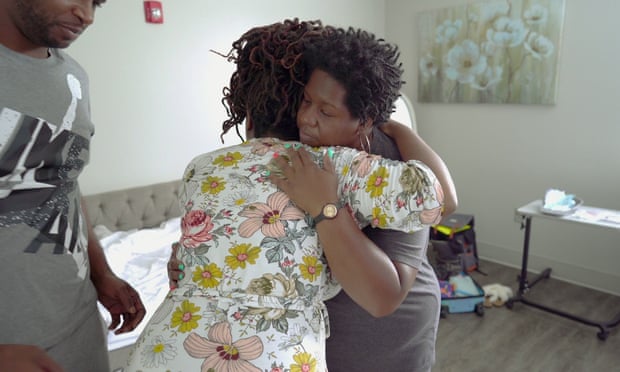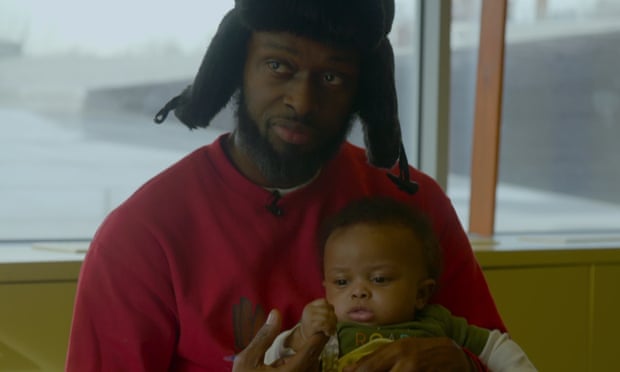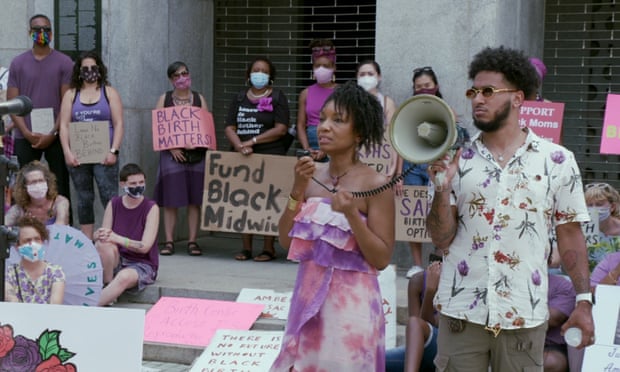‘You are not being heard’: the devastating black maternal mortality crisis in the US
"Aftershock, a grimly revealing new documentary, focuses on grieving families in a system that endangers women of colour

Shamony Gibson spent the final months of her life excitedly anticipating the birth of her second child. “Time is flying, four months already,” she says in a home video collage at the beginning of Aftershock, a new documentary about the black maternal health crisis in the US. “Every day is a new process, you wake up like, ‘Oh my god, I’m that much closer to being a mom again.’”
Gibson, a 30-year-old resident of Bedford-Stuyvesant, Brooklyn, gave birth to her son, Khari, in September 2019 via c-section. For days afterwards, she complained of shortness of breath. She and her partner, Omari Maynard, repeatedly called doctors, who told her it was fine, just relax.
“There wasn’t much of a sense of urgency on their part at all,” Maynard says in Aftershock, out on Hulu this week. Two weeks postpartum, Gibson collapsed following sharp chest pain. Emergency responders and doctors repeatedly asked if she was on drugs, even though her mother, Shawnee Benton-Gibson, explained her symptoms and recent c-section. After 12 hours in the hospital, Gibson died from a pulmonary embolism – a blood clot that travels to the lungs. It’s a relatively common complication of major surgery, such as a c-section, that could have been prevented had anyone listened to her symptoms before it was too late.
There are hundreds of stories like Gibson’s in the United States, the most dangerous industrialized country in which to give birth, particularly for black women. The US has the highest maternal mortality rate by far of any developed country, one that keeps rising even in light of national attention on the issue. In 2020, the most recent year for which we have data, 861 women died of pregnancy or childbirth-related causes in the US. Black women are three to four times more likely – and in New York, eight times more likely – to die as a result of pregnancy than white women, owing in part to medical racism, dismissal of black women’s pain, and lack of adequate care. About 60% of pregnancy-related deaths in the US are preventable, according to the CDC.
The worsening racial disparities of maternal and infant health in the US cut across class lines; as the New York Times reported in 2018, a black woman in the US with an advanced degree is more likely to lose her baby than a white woman with less than an eighth-grade education. “No matter who you are, no matter where you come from, as a black woman in the United States, if you say that you don’t feel well, that something is wrong, you are not being heard,” Aftershock co-director Tonya Lewis Lee said. She pointed to the story of tennis star Serena Williams, arguably the most famous and successful black female athlete in the world, who told doctors she was having a pulmonary embolism after the birth of her daughter Olympia in 2017 and was initially ignored. As Felicia Ellis, a black woman contemplating birth options in Tulsa, Oklahoma puts it in the film: “A black woman having a baby is like a black man at a traffic stop with the police. You have to really pay attention to what’s going on every step of the way.”
Aftermath, directed by Lewis Lee and Paula Eiselt, examines these dire, often faceless statistics through the experience and advocacy of two grieving families: Gibson’s, and the loved ones of Amber Rose Isaac, a black, Puerto Rican New Yorker who died at age 26 of HELLP syndrome, a complication of high blood pressure during pregnancy that can be fatal without any treatment. Isaac knew she was getting inadequate care; just four days before she bled out during an emergency c-section for her son, Elias, she tweeted: “can’t wait to write a tell all about my experience during my last two trimesters dealing with incompetent doctors” at Montefiore Medical Center in the Bronx.
Both Isaac and Gibson felt prepared; Isaac’s mother worked at Montefiore for 26 years, Gibson’s as a medical social and reproductive justice advocate. But the implicit racial biases in American hospitals run so deep, and the US medical system depends so heavily on risk-elevating c-sections, that awareness wasn’t enough. “We’re black and brown, she’s a woman and she’s having a baby. So why would we think we would be exempt?” Benton-Gibson says in the film. “Because we have the knowledge? Knowledge doesn’t save you from this epidemic.”

But that does not invalidate advocacy – Aftershock follows Benton-Gibson and Maynard, as well as Isaac’s partner Bruce McIntyre III, as they turn their grief into activism. Benton-Gibson speaks before the New York City council and a Black Lives Matter rally on the National Mall. Maynard befriends McIntyre, forms a support group for black fathers grieving the loss of their partners to childbirth complications, and paints portraits of the women who did not live to see their children grow up. McIntyre, who told Isaac’s story to media following her death, helps found a birthing center and speaks to a class of OB-GYN students at Harvard Medical School.
Aftershock also explores how we got to this disheartening point despite great leaps in medical science, from the racist roots of professionalized gynecology, to the delegitimization of midwivery, to the over-reliance on c-sections in modern American hospitals. The vast majority of babies in the US are born in hospitals, and almost a third by c-section – compared to 5.5% in 1970, or the roughly 10% to 15% rate recommended by the World Health Organization. C-sections can be life-saving, essential surgery, but as Dr Neel Shah, a Harvard Medical School OB-GYN, puts it in Aftershock, “major surgery is major surgery” – complications are three times higher than vaginal birth. The prevalence of c-sections does not owe to medical need, but a complex web of incentives: c-sections are far quicker than vaginal births, which can take upwards of 12 hours (and thus occupy scarce hospital rooms); doctors are compensated more for c-sections than vaginal births; hospitals are generally risk-averse, which can pressure physicians to opt for c-sections.
Aftershock also explores how things could be: a combination of home births, birthing centers and hospitals; a reintegration of and respect for midwives, traditionally a black female profession in the US dating to the days of slavery; and an emphasis on listening to each woman. “The key is choice,” said Eiselt, the film’s co-director. “We need choice whether or not to become pregnant, to go through with a pregnancy, and if women chooses to go through with a pregnancy, it’s a human right to have choice with whom they birth and where they birth.” As a roadmap for a different future, the film-makers follow Ellis’s journey in Tulsa, which has one of the worst maternal mortality rates in the country, as she gathers information, selects a birthing center, and safely, patiently delivers her first child.

“The film is really arguing for woman-centered care,” said Lewis Lee. “That women should be heard, they should be listened to, and it should be about women finding the support they need around them for their birthing process before, during and after birth.”
“We hope that the film will show some solutions and choices, that it doesn’t have to be the way that it is,” said Eiselt.
The possibility of systemic change in the United States feels remote at the moment, a month after the supreme court overturned Roe v Wade, thus allowing states to ban abortion or, more accurately, encode the widespread criminalization of pregnancy. According to experts, the end of Roe will almost certainly increasethe US maternal mortality rate in the near future. Some of the states with full abortion bans, including Oklahoma, have some of the highest maternal mortality rates in the nation; one estimate found that existing state bans could lead to 75,000 additional births a year for those who cannot access abortions.
It’s a bleak near-term future, but Aftershock brims with a sense of optimism, grounded in the people – Benton-Gibson, Maynard, McIntyre, Shah, midwives, birth equity advocates, birthing centers – working to change norms and outcomes. “When we talk about the US maternal health rate, we’re not just talking about numbers, we’re talking about real people, that has an impact on real families, on real communities,” said Lewis Lee. “And I hope people realize that those people are out there doing the work, and I hope they’re grateful for those people who have lost, but are showing up to make it better for all of us.”
Aftershock is now available on Hulu in the US. "
No comments:
Post a Comment